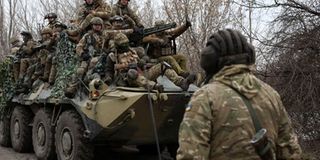Prime
How Russia-Ukraine war is hindering Uganda’s economy

What you need to know:
- There is a disruption in the supply of imports from Russia to Uganda. Before the war, Uganda imports from Russia were at $78.67 million during 2020, according to the United Nations COMTRADE database on international trade.
The Russia-Ukraine war has caused global disruptions. Developing countries, including Uganda, have borne an especially high price for this ongoing crisis given their dependence on fertilisers and cereals from these two countries.
While Bank of Uganda projections indicate that inflation is to continue declining, returning to 5 percent target by the end of 2023, some food prices are still higher.
The supply of agricultural inputs to increase food production will also continue to be cut off by the continuation of the Ukraine war.
Sanctions imposed on Russia have in some way increased geopolitical tensions that have introduced a drastic shift of investors’ interest globally. Before the war in Europe started, Uganda’s foreign direct investment (FDI) had earlier decreased by 18.6 percent from $1.42 billion in FY 2018/19 to $1.2 billion in FY 2019/2020. The continuation of the conflict, coupled with aftereffects of Covid-19, will worsen the chances of attracting more investors.
According to the estimated budget for the financial year 2023/24 released by the Ministry of Finance, Uganda’s public debt is projected to increase from the current 48.4 percent to 53.1 percent in 2023.
Therefore, the continuation of the Russia-Ukraine war is likely to crunch other sources of revenue for the government and incapacitate its ability to service the already high public debt.
Furthermore, there is a disruption in the supply of imports from Russia to Uganda. Before the war, Uganda imports from Russia were at $78.67 million during 2020, according to the United Nations COMTRADE database on international trade.
According to an UNCTAD assessment from 2022 on the impact of the Ukraine war on trade and development, 1.5 million containers of freight were moved by rail from China to Europe. This implies that if container train volumes are added to the Asia-Europe Ocean freight demand, it would entail a 5 percent to 8 percent increase in an already congested trade route. Consequently, this is likely to cause Ugandan imports using the same routes to be delayed by 2023.
The attempts by Western sanctions to cut-off of Russia from the rest of the world, including Uganda, increased the prices of fertilisers through 2021, particularly for nitrogen fertiliser. There is likely to be a further reduction in the supply of fertilisers, whose imports by Ugandan farmers from Russia saw a reduction from $6 million (Shs22 billion) in 2019 to $ 0.4 million (Shs1 billion) by the quarter ending June 2022.
In FY 2021/22 agriculture contributed 24.1 percent to GDP and 33 percent to the country’s export earnings. On the other hand, Ubos estimates that about 70 percent of Uganda’s working population is employed in agriculture thus positioning the sector as backbone of Uganda’s economy, necessitating alternative sources of quality fertiliser to those being provided by the Russian suppliers.
Without these agricultural inputs, the continuation of the Russian-Ukraine war in 2023 is likely to limit more access to fertiliser leading to poor yield and more food insecurity in the country.
Bank of Uganda has done well to avert externally generated inflationary pressures. This year, stronger economic growth of 5.6 percent is expected and requires improving the Central Bank’s forecasting tools to better support policy formulation.
In the long run, the unknown risks come from international geopolitically driven policies aiming at fragmenting the trade system globally.
To minimise the negative impact of the continuation of the Russia-Ukraine war, the government should prioritise its import replacement drive in 2023 to manufacture new products such as fertilisers, grow more cereals and other important raw materials domestically that the country previously imported from Ukraine or Russia. This will also enable Uganda in 2023 to become self-reliant in key sectors of the economy and protect the country from exogenous shocks from the Ukraine war.
Umar Kabanda, Research associate at EPRC, Makerere




